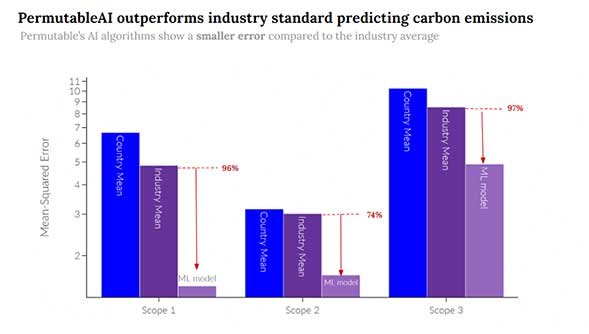Permutable has announced positive initial results from its ongoing partnership with Innovate UK in improving accuracy and transparency.
London
Permutable is pleased to announce positive initial results from its ongoing carbon emissions data modeling programme in partnership with Innovate UK.
The project aims to improve accuracy and transparency around company CO2 emissions globally using machine learning techniques. Current estimates are limited by gaps in global company emissions reporting data. There are large discrepancies in reporting on Scope 1-3 emissions and carbon estimation is a considerable obstacle to correctly tracking the world’s decarbonisation efforts. Permutable’s goal is to fundamentally improve and add more detailed insights into how carbon emissions can be better estimated through the use of artificial intelligence, particularly for companies whose carbon emissions remain unreported.

Previously, emissions would typically be estimated using statistical models – e.g. mean, weighted average (by # of employees) for a certain industry/country pair. These approaches can be very rigid compared to machine learning models. That is because they focus on their ability to explain results, starting from a hypothesis and then modeling predictions based on that. By contrast, machine learning approaches are more flexible because they focus on what best fits the data they are trained for.
The initial results reported here confirm that, using machine learning techniques, the accuracy of carbon emissions modeling for the different emission scopes is 74 – 97% better than using country averages, using smaller amounts of data.
There were 10 industry groups considered in total including Infrastructure, Extractives and Minerals Processing, Financial, Technology & Communications, Resource Transformation, Health Care, Services, Consumer Goods, Food & Beverage and Renewable and Alternative Energy.
This suggests great potential for more accurately predicting corporate emissions across multiple countries and industries, and is expected to increase overall transparency, reliability and therefore confidence in carbon emissions predictions.
Wilson Chan, Founder and CEO of Permutable commented, “We are very pleased with the initial results from the carbon emissions modeling project as part of our work with Innovate UK. The initial results are encouraging and we look forward to building on these results in phase two by incorporating higher quality data from more industries and countries.”
Missing data poses a significant problem across supply chains, where companies are under increasing pressure to conduct due diligence yet are grappling with an incomplete picture of emissions, estimation errors and inconsistencies.
These findings, along with cross-industry consultation, strongly indicate that this research and Permutable’s predictive modelling tools will play an important role within the field of sustainability, where the complexity of carbon emissions reporting can be challenging and time-consuming.
Scott Ellyson, CEO of East West Manufacturing, brings decades of global manufacturing and supply chain leadership to the conversation. In this episode, he shares practical insights on scaling operations, navigating complexity, and building resilient manufacturing networks in an increasingly connected world.